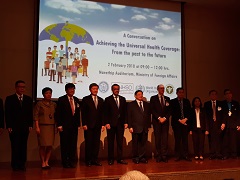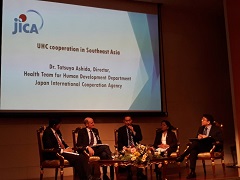- Home
- Technical Cooperation Projects
- Index of Countries
- Asia
- Thailand
- The Partnership Project for Global Health and Universal Health Coverage
- Project News
- "Achieving Universal Health Coverage: From the past to the future" held at Ministry of Foreign Affairs
Project News
2018-02-02
"Achieving Universal Health Coverage: From the past to the future" held at Ministry of Foreign Affairs
BANGKOK, 2 February 2018- The Ministry of Foreign Affairs (MFA), in collaboration with the National Health Security Office (NHSO), organized a Special Talk on "Achieving Universal Health Coverage: From the past to the future" at Narathiwat Room, MFA, to raise public awareness of the need for strong and resilient health systems and universal health coverage (UHC).
Honoured by the presence of Dr. Tedros Adhanom Ghebreyesus, Director-General of the World Health Organization, the event aims to evaluate the current situation in the implementation of the Universal Health Coverage (UHC) in Thailand and future directions as well as to share the views and experiences to achieve the UHC of various organizations, namely NHSO, the World Bank Group, Japan International Cooperation Agency (JICA) and the International Organization for Migration (IOM).
On this occasion, H.E. Mr. Virasakdi Futrakul, Deputy Minister of Foreign Affairs, gave opening remarks marking 12 December as the International UHC Day by the resolution of the 72nd United Nations General Assembly, and stressed on the importance of UHC in national health systems and economy as evidenced by improved health, catastrophic reduction of household expenses, and increased economic return. In his keynote address, H.E. Clinical Professor Piyasakol Sakolsatayadorn stressed that UHC is about the whole of government, not just health sector and that the success of Thai health care system owes much public investments in education, women empowerment, infrastructure development. Dr. Tedros Adhanom Ghebreyesus, Director-General of the World Health Organization, praised Thailand's for the continued leadership and model for other countries in achieving UHC, particularly its sustainable UHC implementation based on community-based approach, community ownership and participation.
The experts from various countries and developing partners shared their views and experiences towards progressive achievement of UHC.
Dr. Sakchai Kanjanawatana, Secretary-General, NHSO, gave a presentation on Thailand's achievement of UHC which drew important lessons for many countries that UHC is viable irrespective of income levels provided that there is strong political and financial commitments, strong civil services acting in the public interest, active civil society organizations, technical capacity to generate and use research evidences, and policies to increase fiscal spaces. In addition, full geographical coverage of functioning primary health care within a district health systems provided a solid foundation for UHC implementation.
Mr. Tim Evans, Senior Director of Health, Nutrition and Population, World Bank Group, elaborated the World Bank's vision of the inclusion of UHC as a goal in the post-2015 development agenda and in helping low-income countries to achieve UHC through reforms on access to financing and service delivery.
Dr. Tatsuya Ashida, Director of Health Team for Human Development Department, JICA shared his experiences in strengthening health security and promotion of UHC in Asia and the Pacific region through financial assistance, mainly grants and loans, and technical cooperation for capacity development of health personnel and organization. He introduced the Thailand-Japan Partnership Project for Global Health and Universal Health Coverage (GLO+UHC) which is considered as a flagship project for "North-South-South Cooperation", whose objective is not only for capacity development for other countries, but also to promote UHC at the national, regional, and global levels.
Dr. Nenette Motus, Regional Director for Asia and the Pacific, IOM, commended Thailand as a leader in championing the health of migrants and the strong partnership between IOM and the Ministry of Public Health in promoting migrant inclusive policies that address increase access to healthcare among migrants and vulnerable communities.
The event was well received by more than 100 participants that consisted of ministry officials, developing partners, health experts and professionals, private sectors and civil societies from various countries.


- About JICA
- News & Features
- Countries & Regions
- Our Work
- Thematic Issues
- Types of Assistance
- Partnerships with Other Development Partners
- Climate Change / Environmental and Social Considerations
- Evaluations
- Compliance and Anti-corruption
- Science and Technology Cooperation on Global Issues
- Research
- JICA Development Studies Program / JICA Chair
- Support for the Acceptance of Foreign HRs / Multicultural and Inclusive Community
- Publications
- Investor Relations
